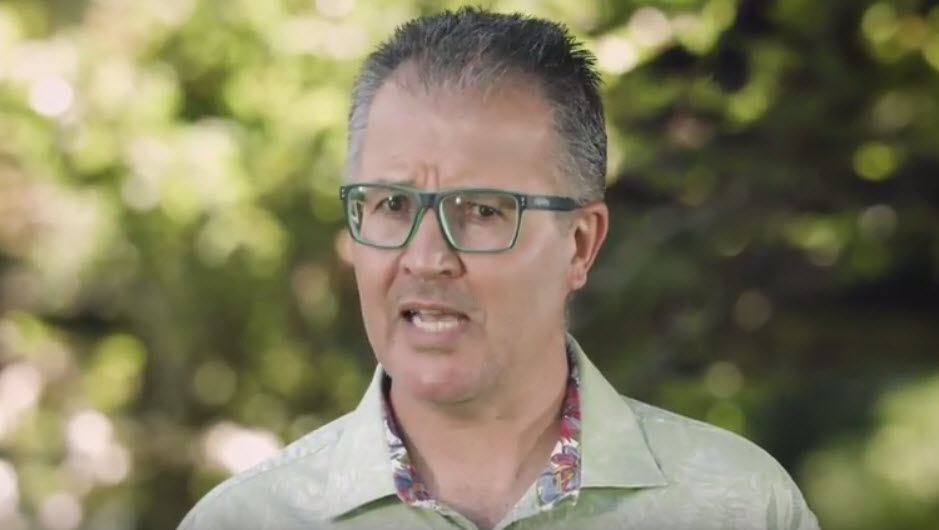After trying to hide his chronic addiction to alcohol and the drug methamphetamine, comedian Willy de Wit had been clean for a month when he received a text message one night in April 2016. It was from a former supplier wanting to know if he needed anything.
The temptation proved too strong. Reasoning with himself that he could do one last hurrah with a quarter of a gram of meth and still continue on his path to sobriety, Willy was halfway through his third hit when he collapsed trying to get some water.
For 12 hours, he lay on his bedroom floor, barely breathing after suffering a haemorrhagic stroke.
“Without a doubt, my addiction caused me to stroke,” concedes Willy. “Meth use increases the chance of having a stroke caused by a brain bleed by almost five times.
“At the time, I’d been working as a brand manager for a skin nutrition company owned by Suzy Heazlewood and she had arrived at my house the next morning for a scheduled meeting,” he recalls.
“When I didn’t answer the door, or my phone, she let herself in with the spare key, found me and called an ambulance. We were told that if it hadn’t been for her finding me, I would’ve died within the hour.”
Welcoming the Weekly into his art-filled Devonport apartment on Auckland’s North Shore, Willy leans on his walking stick and apologises if his “stupid brain” doesn’t keep up.

Kiwi artist Diana Firth’s painting hangs on his wall, and Willy says it’s symbolic of how he feels now.
He needn’t have worried. After 18 months of intense rehabilitation – learning to walk, talk and live on his own again, albeit with a paralysed left side – Willy has come a long way.
The 61-year-old has also written a tell-all memoir called Drink, Smoke, Snort, Stroke…, which has taken him three years to “tap out 65,000 words with three fingers”.
Released this month, it’s a raw, honest and often hilarious account about what it was like to pioneer New Zealand’s stand-up comedy scene in the 1980s, and work with legendary entertainers Billy T. James, David McPhail and Jon Gadsby.
“It’s not a triumph over adversity tale though,” muses the former radio host. “But kind of a book of two halves of how my life was one fun ride until it really wasn’t.
“I’ve always struggled with depression and they say eight out of 10 people will get depression after a stroke. If you had depression before the stroke, then you’re likely to get it worse.
“So my good mate [and entertainer] David Downs encouraged me to write a book – despite my disability, I’m thankful I can still write – and it’s been cathartic for me. It’s given me a reason to get up every day, to have a focus.”
Willy reveals he’s also had what others may see as an unlikely support person during every step of his recovery – his ex-wife and “bestie” Jo Mere Pilkington.

Ex-wife Jo has been his rock. “I love you, mate,” Willy says.
“She’s been my rock,” he says, reaching out to squeeze Jo’s hand.
“She came to the hospital five days a week for months after my stroke, helped to feed me so I would eat, washed my clothes and brought new ones up, and just supported the nurses where ever she could.
“The way Jo, along with my sister Anne, stepped up to care for me has been nothing short of extraordinary.”
Jo, 55, laughs, “All my friends have said to me, ‘How on earth can you do so much for your ex?’
“But he couldn’t do it on his own. We had 14 years together and raised our child [daughter Mahu, now 21], and we’re still best friends.
“I’m now remarried to my wonderful husband Mark, who knew Willy before knowing me, so it’s like an extended whānau, really. Mark drove Mahu to visit Willy in hospital every other day.”

Daughter Mahu was by her dad’s side in hospital.
When Jo – who owns costume and prop hire company First Scene – was recently made a Member of the New Zealand Order of Merit for services to the events sector, she joked that her medal should have instead been for services to her ex-husband.
She remembers the first moments of turning up to Auckland Hospital after hearing of Willy’s stroke.
“He was bleeding internally and they couldn’t stop it because they couldn’t locate the source,” she tells. “They told me if the bleeding couldn’t be stopped within 24 hours, he would die.
“I had had no experience with strokes at all. So I naively said to the doctor, ‘But if he doesn’t die, I’m guessing Willy will be here for like two weeks? Then I can just take him home and get him back on his feet?’
“The doctor looked at me like I was stupid. I really had no idea. I would often gently stroke Willy’s hand, forgetting he had no feeling in that arm at all!”
The pair first met back in the late ’80s when she worked at radio station 89FM and he was dating her colleague.
Then Jo went overseas, where she worked as tour manager for Eurythmics’ Dave Stewart. But when she returned from London, she thought she’d give Willy a call to catch up with him.
Willy explains, “We had instantly clicked as friends. Obviously, she was drop-dead gorgeous and we picked up right from where we left off, began dating and she was my first real love.”
Adds Jo, “But we had been engaged seven years when I gave him the ultimatum that I wanted to be married and have a baby, and that Willy needed to make that happen within 36 hours,” she grins.
They married on Waiheke Island – where comedians Jeremy Corbett, Dean Butler and Mark Wright were Willy’s groomsmen – and separated seven years later.

“To my chagrin, I’m the one responsible for our marriage ending,” admits Willy, who is also father to Lizzie, 32, from a previous relationship. “I certainly wasn’t the best husband to be with… alcoholic, depressed, drug-use.”
“It was like he was always edgy,” reflects Jo, who is of Ngāti Kahungunu descent. “For a couple of years after we separated, it was hard to remain friends with him. But you move on and we had a child to co-parent, so I couldn’t not talk to him.”
Born with the less-than- showbiz name of William McGechie, Willy spent his school years at Auckland Grammar, where he learnt music and classical ballet, before leaving early to work in a garden centre.
While lead singer of the band Rhythm Method, he decided on a whim to enter a comedy competition in 1983. Five years later, his live comedy troupe gained fans nationwide with the TV series Funny Business.
It led Willy into another branch of broadcasting – radio. For 11 years, he hosted shows for Radio Hauraki, alongside Funny Business collaborator Dean Butler, before the duo was made redundant.

Willy in his Funny Business days.
“Losing my Radio Hauraki job in 2011 affected me greatly,” he shares. “That’s when the spiral truly began. I turned to meth and hid the weight loss from people by saying how I was on some new healthy diet.”
After the stroke, Willy’s speech was non-existent, but he understood what was being said to him.
“Every day, I’d push my droopy jaw upwards to try and eliminate the droop. That was followed by practising my consonants for hours.”
Jo had also been told that he would never be able to walk again.
“My reaction was, ‘Well, you don’t know this man very well, then,” she recalls. “I said, ‘He’ll be walking within six months.'”
Willy did it in eight months. He describes his turning point after being visited in hospital by fellow comedian David Fane, who was 32 when he had a stroke in 1999.
“Dave was so supportive and told me, ‘You’re going to get stronger’ and all I had to do was channel my energies into getting well. I had tears in my eyes and couldn’t really say any coherent words at that stage.
“He wiped away my tears, gave me the most heartfelt hug and that was it. I will be forever grateful to him for coming. He changed my mindset and gave me hope.”
Six years on, Willy says his speech is 95 percent there and he’s found a renewed “clarity” on life.
“Of course I have regrets about how my actions have impacted on others – those close to me. I let down so many people. And I want to say how grateful I am for those who have stuck by me.
“I’m so appreciative to Jo for her continued help and support. I love you, mate,” he smiles at her. “I don’t know how I would have survived this without you.”


